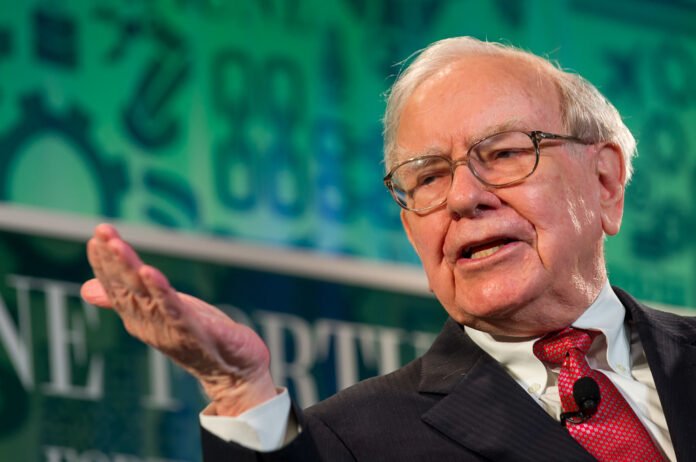OMAHA, NEBRASKA — At what will be remembered as a historic and emotionally charged annual shareholder meeting, Warren Buffett, the legendary chairman and CEO of Berkshire Hathaway, delivered a sharp rebuke of the United States’ current trade policy. Labeling the administration’s tariff-centric approach as “a big mistake,” Buffett warned of long-term repercussions both economically and geopolitically, while emphasizing the mutual benefits of global prosperity.
Buffett’s Final Meeting as CEO Underscored by Candid Critique of Trade Policy
The 93-year-old investor, speaking at the company’s annual general meeting in Omaha on Saturday, expressed clear frustration with the use of trade as an instrument of confrontation, cautioning that tariffs, when used inappropriately, can escalate into forms of economic warfare.
“Trade should not be a weapon,” Buffett told a packed room of shareholders and press. “Trade and tariffs can be an act of war. And I think it’s led to bad things. Just the attitudes it’s brought out,” he said, as reported by CNBC.
Buffett’s critique came amid the backdrop of mounting global anxieties over protectionism, with the US increasing tariffs in multiple sectors and countries, including its growing confrontation with China. His remarks resonated deeply with the audience, who responded with prolonged applause, reflecting shared disapproval of the country’s trade stance.
Global Investor Sentiment and the ‘Buffett Warning’
Yang Delong, chief economist at Shenzhen-based First Seafront Fund and a veteran attendee of the annual meeting, told Global Times that Buffett’s comments were reflective of widespread investor concerns about the direction of US economic diplomacy.
READ MORE: Qantas Employee Hospitalised After Aerobridge Fall at Sydney Airport
“The ability of the US to continue championing free trade has fundamentally shifted,” Yang said. “This is one of Buffett’s greatest concerns, and it’s a worry shared by investors everywhere.”
Yang added that the prominence of trade as the first question raised during the meeting highlighted its growing salience. In his view, Buffett’s message is not just a technical economic observation—it’s a moral and strategic call for a reevaluation of America’s global economic posture.
Critique Rooted in Long-Term Strategy and Humanism
Buffett stressed that global prosperity is not a zero-sum game. “The more prosperous the rest of the world becomes, it won’t be at our expense. The more prosperous we’ll become, and the safer we’ll feel, and your children will feel someday,” he said.
He added that pursuing narrow protectionist victories at the cost of broader diplomatic relationships is counterproductive: “It’s a big mistake, in my view, when you have seven and a half billion people that don’t like you very well, and you’ve got 300 million that are crowing in some way about how well they’ve done – I don’t think it’s right, and I don’t think it’s wise.”
Berkshire Hathaway’s Struggles Reflect Economic Headwinds
Buffett’s remarks coincided with Berkshire Hathaway’s disclosure of a 14 percent year-over-year decline in operating earnings, which dropped to $9.64 billion in Q1 of 2025. The company cited macroeconomic volatility and geopolitical risk—including the US tariff policy—as core contributors to the performance drop.
“Periodic operating results may be affected in future periods by impacts of ongoing macroeconomic and geopolitical events,” the company said in its financial summary.
Berkshire’s business portfolio, which spans insurance, railroads, utilities, and consumer goods, is viewed as a barometer for the health of the broader American economy. Hence, the warning from Buffett carries not only the weight of experience but also data-backed urgency.
The End of the Buffett Era and the Rise of Greg Abel
Adding to the emotional gravity of the event was Buffett’s long-awaited announcement that he will step down as CEO of Berkshire Hathaway by the end of 2025. Greg Abel, currently vice chairman of non-insurance operations, is set to succeed him, pending board approval.
Abel’s ascension marks the first leadership transition in decades for the conglomerate, and it comes at a time of considerable economic uncertainty.
The audience’s reaction was immediate and emotional. Buffett received a standing ovation, with many attendees visibly moved by the end of what has become known globally as the “Buffett era.”
“It’s hard to imagine the company without him,” Yang Delong said. “He represents not just business acumen but also a kind of ethical compass that’s rare in global finance.”
A Sobering Message to Washington and Wall Street
Buffett’s rebuke of US trade policy arrives at a politically sensitive time, as the country edges toward the 2026 presidential cycle and its leaders attempt to recalibrate their economic policies in the face of mounting debt, inflationary pressures, and cooling investor confidence.
Critics of the Biden and Trump administrations alike have warned that escalating tariff wars—particularly with China—could drive up consumer prices, disrupt supply chains, and prompt retaliatory measures that hurt American exporters.
Buffett’s comments add gravitas to these warnings, especially as they come from someone who has consistently supported capitalism, innovation, and American exceptionalism.
Conclusion: A Call for Rationality and Cooperation
As Buffett prepares to step away from day-to-day leadership, his final public act as CEO was to deliver not a celebration, but a caution. It was a call for long-term thinking, international cooperation, and a re-commitment to economic diplomacy rooted in mutual benefit, not competition.
Whether Washington will listen remains uncertain, but the audience in Omaha—and investors around the world—clearly did.
